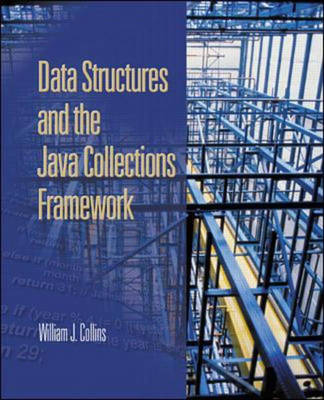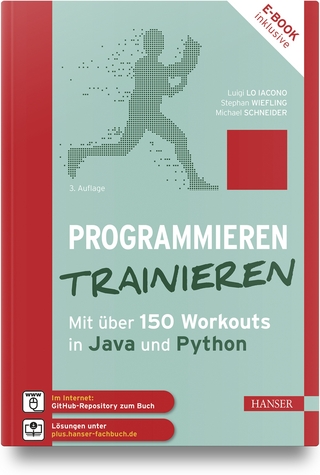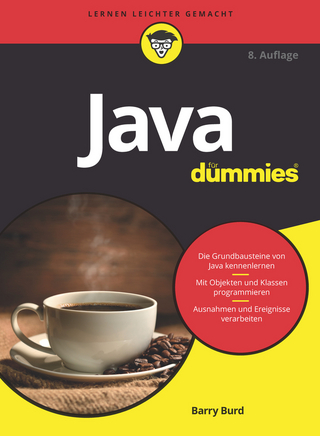
Data Structures and the Java Collections Framework
Seiten
2001
Osborne/McGraw-Hill (Verlag)
978-0-07-236964-9 (ISBN)
Osborne/McGraw-Hill (Verlag)
978-0-07-236964-9 (ISBN)
Designed for a course in data structures, where the implementation language is Java. This book focuses on teaching students how to apply the concepts presented, and includes many applications and examples. It provides programming projects, which get students thinking deeper, and is suitable for students.
"Data Structures and the Java Collections Framework" by William Collins is designed for a course in data structures where the implementation language is Java. This student-friendly book focuses on teaching students how to apply the concepts presented and so includes many applications and examples throughout the book. Additionally, he provides programming projects, which get students thinking deeper. Collins teaches students how to use the data structures provided in the "Java Collections Framework", as well as teaching them how to build the code themselves. His goal is give students an excellent background in creating data structures themselves, as well as make them comfortable using the standard library. Using the "Java Collections Framework" gives students the opportunity to work with excellent fully tested code. Further, since this is a standard library of classes, students will be able to continue to use it for other courses and as they move into industry. Another feature of this text is that labs are provided with the book. These labs can be used as open-labs, closed labs, or homework assignments and are designed to give students hands-on experience in programming.
These optional labs provide excellent practice and additional material for the students.
"Data Structures and the Java Collections Framework" by William Collins is designed for a course in data structures where the implementation language is Java. This student-friendly book focuses on teaching students how to apply the concepts presented and so includes many applications and examples throughout the book. Additionally, he provides programming projects, which get students thinking deeper. Collins teaches students how to use the data structures provided in the "Java Collections Framework", as well as teaching them how to build the code themselves. His goal is give students an excellent background in creating data structures themselves, as well as make them comfortable using the standard library. Using the "Java Collections Framework" gives students the opportunity to work with excellent fully tested code. Further, since this is a standard library of classes, students will be able to continue to use it for other courses and as they move into industry. Another feature of this text is that labs are provided with the book. These labs can be used as open-labs, closed labs, or homework assignments and are designed to give students hands-on experience in programming.
These optional labs provide excellent practice and additional material for the students.
1 Important Features of Java 2 Interfaces and Collection Classes 3 Introduction to Software Engineering 4 Recursion 5 Array Lists 6 Linked Lists 7 Queues and Stacks 8 Binary Trees and Binary Search Trees 9 Balanced Binary Search Trees 10 Tree maps and Tree sets 11 Priority Queues 12 Sorting 13 Searching and The Hash Classes 14 Graphs, Trees, and Networks Appendix 1 Mathematical Background Appendix 2 The GUI and GUIListener Classes Appendix 3 The Java Collections Framework
| Erscheint lt. Verlag | 1.9.2001 |
|---|---|
| Zusatzinfo | 205 illustrations, index |
| Verlagsort | New York |
| Sprache | englisch |
| Maße | 190 x 236 mm |
| Gewicht | 1279 g |
| Themenwelt | Informatik ► Programmiersprachen / -werkzeuge ► Java |
| Informatik ► Theorie / Studium ► Algorithmen | |
| Mathematik / Informatik ► Informatik ► Web / Internet | |
| ISBN-10 | 0-07-236964-7 / 0072369647 |
| ISBN-13 | 978-0-07-236964-9 / 9780072369649 |
| Zustand | Neuware |
| Haben Sie eine Frage zum Produkt? |
Mehr entdecken
aus dem Bereich
aus dem Bereich
mit über 150 Workouts in Java und Python
Buch (2023)
Carl Hanser (Verlag)
29,99 €
Einführung, Ausbildung, Praxis
Buch | Hardcover (2023)
Rheinwerk (Verlag)
49,90 €


